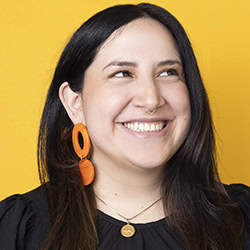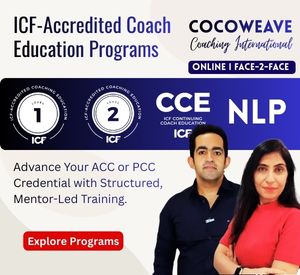What aspects of our interactions, so uniquely human, are unlikely to be replaced by AI?
That was the question Alex Haitoglou and Bryan Watson were left with after attending an artificial intelligence (AI) conference in San Francisco, USA, in 2019.
As business leaders and past CEOs, they had already experienced the profound power of coaching. They knew there was a direct link between helping people grow and business outcomes, and they were interested in learning how to use AI to develop better leaders.
Seeking the answer to this question led them to develop Ovida, an AI-powered platform to help leaders master their communication skills. They wanted to build a product that would allow anyone within an organization to get insights for improving their coaching skills, such as asking better questions or active listening.
According to the Ovida website, they are deeply optimistic about the potential of AI to positively impact humans. Instead of avoiding AI, Alex suggests getting to know it and using it to help you double down on what makes us human.
4 Steps to Leverage AI as a Coach
Below, Alex, who is also a part of ICF’s Technology and AI Task Force, shares four strategies for coaches who want to become irreplaceable with AI.
Embrace AI and Emerging Technology
When you try an AI product and don’t think it’s that good, Alex encourages you to remain open-minded and not to discount how disruptive this technology will be to their industry based on its current performance.
“The AI train is not stopping,” Alex says. “AI is currently the worst it’ll ever be. It will get exponentially better from here.”
As a coach, you can use AI tools to complement your work.
With an AI-assisted tool like Alex’s company, Ovida, more leaders can have access to data to improve their performance.
“Working with a coach is essential. No one likes data thrown at them,” Alex warns.
The analytics may help leaders identify areas for improvement, but the information alone is not enough. As a coach, you can work with a client to review the analytics and identify areas for improvement. That data will help you and your client create a development plan. As your clients deliberately practice the skills they want to improve, you can continue to work together and monitor their progress.
Be Smart about Your Privacy and Data Security
Many conversations surrounding AI involve privacy concerns. Alex agrees that these are essential considerations. He suggests asking “a lot of questions about how you and your client’s data will be handled.”
Be conscious of the implications of all the tools you use. It’s not just about AI.
“If you’re saving Zoom recordings locally on your machine, do you have proper security protocols?”
You should read the privacy policy of every website and platform you use. That means asking things like how data is being stored and where. Understand which geography houses your data, as every region has regulatory differences. What are the security protocols of the platform you’re using? Can you delete your data? Can you take away your consent?
“All of us must become informed consumers of the technology we use,” Alex says.
Experiment with AI Tools
Alex believes the best way to understand what AI tools and coaching bots are good at and what areas need work is to test-drive them.
“There are really cool tools out there. Experiment and have fun!”
He acknowledges that some coaches may be afraid to experiment because it might feel vulnerable. Still, he argues that it’s important to remember that fear, discomfort, and vulnerability are necessary for growth.
Alex suggests that you try one tool per month. Most of them have a free trial period. At the end of the year, you will have tried 12 different tools and better understand what’s available in the market.
Get Very Specific about the Things You Do that Make You Uniquely Human
Through testing coaching bots and other emerging technology, you will learn what AI is good at doing and what it’s not.
AI tools can nudge clients automatically and follow up at the right time. They can even facilitate a GROW model session.
“There are parts of the coaching discussion that are very repetitive,” says Alex. “And [AI coaching bots] can follow the GROW model perfectly.”
As it turns out, AI knows exactly what to ask, knows the sequence of questions, will ask additional questions to fill in the gaps, and will never forget what a client told it. That’s why Alex suggests focusing on the parts of coaching interactions that you can do better than a machine.
“Focus on the things that make you uniquely human and get really, really good at doing those things.”
To improve your human connection skills, Alex suggests taking inspiration from the world of sports. Athletes who want to improve their performance record themselves playing, see what they’re doing well, and create improvement plans with their coaches.
That’s where AI tools like Alex’s app, Ovida, come in. They allow you to record your meetings and watch yourself while giving you data on things like interruptions, talk time, and types of questions asked. Armed with the analytics of your recorded sessions, you can practice self-reflection, make an improvement plan, and deliberately work on the skills you want to enhance.
With the right tools and support, you can improve the parts of your interactions that AI won’t be able to replicate.
Staying Ahead: Continuous Learning and Adaptation of AI In Professional Coaching
With these four steps, you can harness AI to make yourself irreplaceable. In doing so, you are fostering a mindset of continuous learning, which is essential for personal and professional growth in our rapidly changing world. AI and other emerging technologies can simplify your processes and provide innovative solutions for how you work. Plus, they can support you in providing better experiences and outcomes for your clients.
Disclaimer
The views and opinions expressed in guest posts featured on this blog are those of the author and do not necessarily reflect the opinions and views of the International Coach Federation (ICF). The publication of a guest post on the ICF Blog does not equate to an ICF endorsement or guarantee of the products or services provided by the author.
Additionally, for the purpose of full disclosure and as a disclaimer of liability, this content was possibly generated using the assistance of an AI program. Its contents, either in whole or in part, have been reviewed and revised by a human. Nevertheless, the reader/user is responsible for verifying the information presented and should not rely upon this article or post as providing any specific professional advice or counsel. Its contents are provided “as is,” and ICF makes no representations or warranties as to its accuracy or completeness and to the fullest extent permitted by applicable law specifically disclaims any and all liability for any damages or injuries resulting from use of or reliance thereupon.
Authors
Post Type
Blog
Audience Type
Coach Educators, Experienced Coaches, External Coaches, HR & Organizational Leaders, ICF Assessors, ICF Chapter Leaders, Individuals Interested in Experiencing Coaching, Internal Coaches, Managers/Leaders Using Coaching Skills, Mentor Coaches, New Coaches, Professional Coaches, Team and Group Coaches
Topic
Future of Coaching, Industry Disruption and Innovation
Related Posts
How to Master AI and Authenticity in Coaching
How do you stay relevant when AI can now draft client assessments…
Personal Branding for Coaching — Amplified by AI
How can you stand out as a coach in a crowded market…
Coaching as a Strategic Advantage: What the 2025 Global Coaching Study Reveals
The 2025 ICF Global Coaching Study highlights continued global growth in professional coaching alongside…






